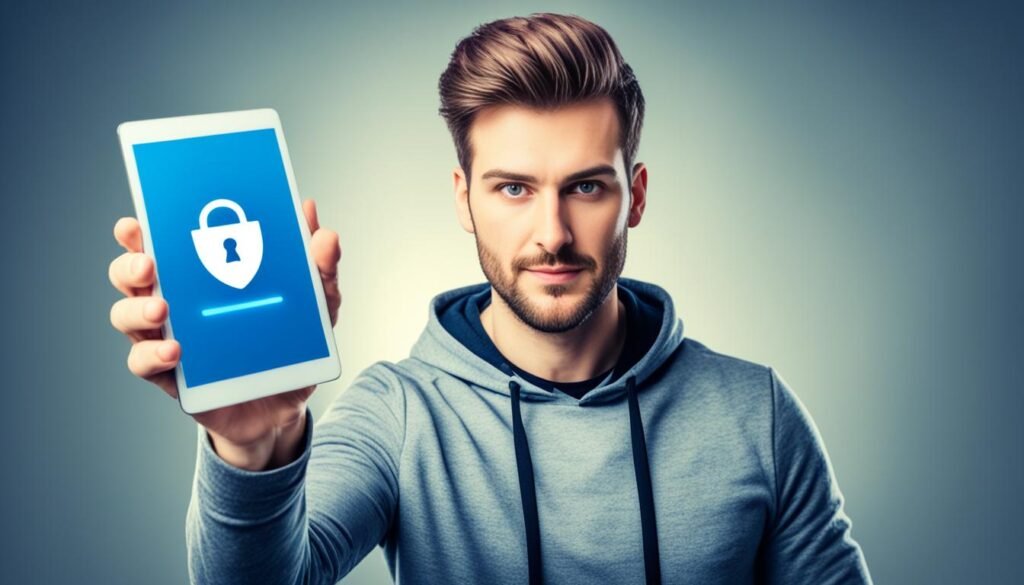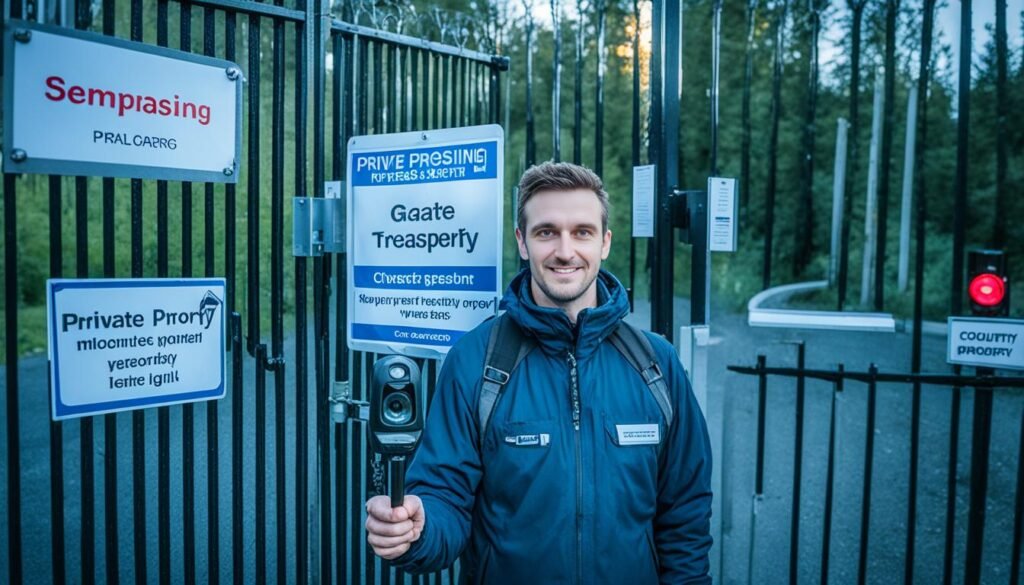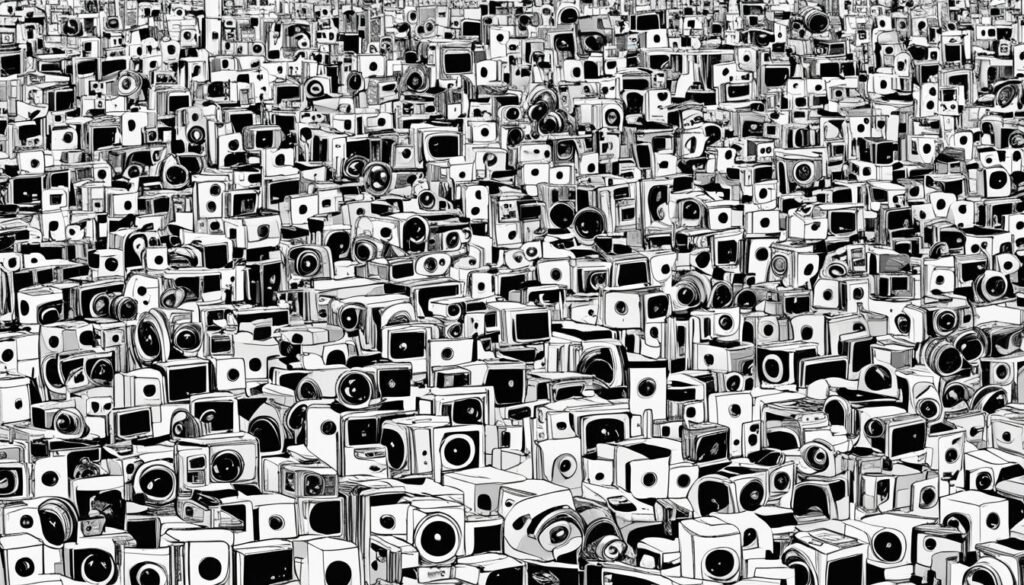Have you ever thought about how to stay safe in our unpredictable world?
Personal security is more than just learning how to defend yourself. It’s also about keeping adults safe from abuse and neglect. It’s about making sure everyone has the right to live without fear, while still respecting their freedom and dignity.
Keeping well means looking after your body, mind, and feelings. It also means having a stable life socially and financially. By staying alert and managing risks, you can help keep yourself and others safe.
Understanding Personal Security
Personal security means taking steps to stay safe from harm, abuse, or neglect. It’s about keeping your body, dignity, health, and feelings safe. Having a strong personal security plan is key.
Defining Personal Security
Personal security covers many ways to protect yourself from threats. Being aware of your surroundings is important. Knowing about crime trends and how to spot dangers helps a lot.
Good habits include reading people’s body language and fitting in with the local culture. Staying updated on local news and avoiding risky places also helps keep you safe.
The Importance of Personal Security
Personal security is vital for your well-being. It means being ready for threats and acting fast. Knowing how to spot threats and react is key.
While checklists might not work well in stressful situations, a solid security plan is crucial. Training, getting ready, and practicing are essential for a secure life.
Self-Defense Strategies
Learning self-defense strategies is key for boosting personal security. Knowing basic moves and picking the right tools can save lives. Crime rates are dropping, but risks like theft and assault are still there. Being aware and ready is crucial.
Basic Self-Defense Techniques
It’s vital to learn basic self-defense techniques for better personal security. Knowing how to defend yourself can keep you safe. Awareness is also key, like noticing exits and spotting odd behaviors.
Setting boundaries and using clear communication can also help avoid fights. This means keeping a safe distance and speaking up when needed.
Choosing the Right Self-Defense Tools
Picking the right self-defense tools is part of a solid self-defense strategy. Tools like pepper spray and stun guns add extra security. They should be easy to carry and use, fitting your skills and comfort.
Carrying a cell phone and using personal safety apps is also smart. These let you call for help quickly and alert friends in danger.
For advanced tools, learning how to use them safely is a must. Security officers get training on handling weapons and disarming others. This shows the value of having the right tools and knowing how to use them safely.
Home Security Measures
Investing in strong home security is key to keeping your home safe. It not only protects your property but also gives you peace of mind. You can use both traditional and smart home tech to boost security.
Securing Entry Points
Protecting doors and windows is crucial to stop unauthorized entry. Homes with deadbolts and locking doorknobs are less likely to be broken into. Make sure all doors, windows, and porches have locks and deadbolts. Adding door jammers and strike plates can also help.
Keep all entry points well-lit and visible. Motion lights, costing $10-$15, are a great safety tool. They scare off burglars by suddenly lighting up. Leaving a TV or radio on when you’re out makes it seem like someone is home.
Using double-pane, shatter-resistant glass windows makes breaking in harder. Cameras and security signs can make burglars think twice. They can make your home up to 300% less likely to be targeted.
Using Smart Home Security Systems
Smart home security systems can really improve your home’s safety. They offer real-time monitoring and alerts. This proactive approach can prevent burglaries and give you peace of mind.
Smart locks let you lock and unlock your door with your phone. This means no more worrying about lost keys. Cameras not only scare off burglars but also help in catching them if there’s a break-in. These systems protect your home inside and out.
Don’t forget to protect your WiFi with strong passwords. Keeping valuables hidden and in safes can also boost security.
Using both traditional and smart tech gives you the best home security. These steps create a safe space that deters burglars and protects your property.
Personal Safety Tips
When you travel, keeping safe is crucial. Using the right safety tips and apps can make a big difference. Knowing how to stay safe can make everyday life less stressful.
Safe Travel Practices
Being prepared is key to staying safe while traveling. 56% of criminal attacks on travelers happen in hotel rooms or near them. Always check who is at your door and keep your room locked. Also, use ATMs in daylight as most ATM crimes are at night.It’s important to park in well-lit areas since they have fewer theft and assault cases. Be careful when walking to your car, as most assaults happen then. Walking with someone can also help, as only 30% of assaults are against lone pedestrians. Always lock your car and don’t leave your keys inside, as most car thefts are from unlocked cars.
Personal Safety Apps
Safety apps can add an extra layer of protection. They offer emergency alerts, location tracking, and quick contact to emergency services. Choose apps with good safety features and positive reviews.Apps like Noonlight provide real-time tracking and emergency help. Sharing your location with trusted friends can also be a smart move. It keeps you connected and can prevent many dangers.
Emergency Preparedness
Being ready for emergencies is key to staying safe. Sadly, 85% of people aren’t ready for disasters. It’s important to know what to do and take steps to be prepared.
Creating an Emergency Kit
Having an emergency kit is crucial. Yet, 60% of homes lack a kit with the basics for three days. Make sure your kit has:
- Water (one gallon per person per day for at least three days)
- Non-perishable food
- Flashlight and extra batteries
- First aid kit
- Medications (with 70% of individuals currently not having a list of medications and dosages)
- Copies of important documents in a waterproof and portable container
Emergency Contact Plans
A good contact plan is vital in emergencies. Over 50% of people lack a plan for contacts and meeting spots. Here’s how to improve your readiness:
- Maintain emergency contact information for all family members
- Choose two meeting locations: one near home and one outside the neighborhood
- Have an out-of-area emergency contact
- Discuss responsibilities and roles within your family for better personal readiness
Practice evacuating your home twice a year and check your emergency plan often to stay ready.
Protecting Your Digital Life

In today’s digital world, keeping your online life safe is key. A big issue is that 83 percent of Americans use weak passwords (Avast Press). This makes them easy targets for hackers. Many people (81 percent, according to One World Identity) use public WiFi, which also brings risks.
To fight these dangers, strong data protection steps are a must. Many folks have over 10 accounts with passwords, some even over 50. That’s why tools like LastPass and Bitwarden are great for keeping passwords safe. They encrypt and store your passwords securely, reducing the chance of hackers getting in.
Using two-factor authentication (2FA) is another smart move for online privacy. Apps like Google Authenticator and Microsoft Authenticator add an extra security layer. They make it tough for hackers to get into your accounts. VPNs also help by hiding your IP and location, keeping your data safe.
But, data breaches are still a big worry. In 2020, over 37 billion records were exposed in 3,932 breaches, a 141% jump from the year before. It shows how vital it is to know about laws like the California Consumer Privacy Act (CCPA) and the General Data Protection Regulation (GDPR). These laws make sure your data is handled right and you have control over it.
When dealing with cyber safety, it helps to look at trusted sources like Forbes and the New York Times. They offer good advice and insights. By following strong digital security steps, you can lower your risk of cyber attacks and keep your online life private.
Financial Security in the Digital Age
In today’s digital world, keeping your finances safe is more important than ever. With online banking on the rise, protecting your financial info is key. Cybersecurity Awareness Month reminds us to guard our money from cyber threats.
Phishing, malware, and ransomware attacks show why strong security is needed. These threats highlight the importance of protecting your financial assets.
Preventing Identity Theft
Being careful is the first step in preventing identity theft. Use strong, unique passwords with at least 15 characters. Mix in upper and lower case letters, numbers, and special characters for better security.
Adding Two-Factor Authentication (2FA) makes it harder for hackers to get in. Check your financial statements often for anything fishy. Always use secure networks and think about using a VPN for online banking, especially on public Wi-Fi.
Best Practices for Online Banking
Keep your devices and apps up to date to stay safe online. Automatic updates can help protect you from new threats. This way, you don’t have to worry about keeping your systems secure.
Know about the latest phishing scams to stay ahead. These scams can look like emails, texts, or calls. Banks like First International Bank & Trust use top-notch security to keep your info safe. They never ask for your passwords or PINs through email or text.
Mobile wallets like Apple Pay and Google Pay offer safe ways to pay without cards. These services use strong security, making them a good choice. Keeping up with fintech and cryptocurrency trends can also help you stay secure in the digital world.
Maintaining Mental and Emotional Well-being
Keeping your mental and emotional health strong is key to feeling secure. Understanding the value of mental health helps you make better choices and feel more satisfied with life. It’s about finding balance in work and personal life, which helps you handle challenges with strength and grace.
Importance of Mental Health
Good mental health is linked to better physical health. It means lower blood pressure, less risk of heart disease, and a healthier weight. Taking care of your mental health helps you work well, deal with stress, and talk better with others.
It also means taking time for yourself, being around positive people, exercising, and eating well. This approach boosts your emotional health.
Stress Management Techniques
Handling stress well is key to keeping your mind and heart healthy. Mindfulness, like meditation and yoga, helps a lot. So do deep breathing, progressive muscle relaxation, and other calming activities.
It’s also about avoiding negative news, keeping good friends, and getting help when you need it. Setting limits and enjoying hobbies can also help reduce stress and keep your mental health in check.
Social Well-being and Personal Security
Social well-being and personal security go hand in hand. In OECD countries, about 74% of people feel safe walking alone at night. But, safety levels vary a lot, with Austria and Iceland having over 85% feeling safe, and South Africa at just 40%.
The Role of Community in Security
Community support is key to feeling secure. Getting to know your neighbors and joining local groups can make you feel more secure. In places where people feel close, there are fewer crimes, like in Austria with a rate of 0.5 per 100,000 people.
Trust in relationships helps us get through tough times. Countries with strong community ties feel safer, which helps everyone stay secure.
Building a Support Network
Having a strong support network is essential for safety. This can be family, friends, or community folks. Apps like Bumble BFF help make these connections. Also, those with more money and education often feel safer and face less crime.
Being active in the community also boosts well-being. Helping out in local projects improves both your area and your life. Keeping up a network of support strengthens your sense of safety and well-being.
Getting involved in community activities or making new friends can really improve your safety. A well-rounded approach to social health can make you feel much more secure.
Personal Security: A Comprehensive Approach
Personal security means looking at all parts of our lives. It covers physical safety, home defense, digital protection, and financial stability. By combining these, we can keep ourselves and our loved ones safe from threats.
Studies show that homes without security systems are three times more likely to be broken into. This shows how important it is to have safety measures in place. It helps protect us from harm.
When it comes to digital protection, the stakes are high. In 2019, online scams led to losses over $3.5 billion. Identity theft hit around 16.7 million U.S. consumers in 2017. These numbers highlight the need for strong online security and smart online banking habits.
Protecting our digital lives is key to our security. But it’s not just about online safety. Being connected in our communities and keeping our minds healthy is also vital. Over 70% of child abductions involve someone the child trusts, so being aware and building strong community ties is crucial.
Keeping our mental and emotional health up is also key. Learning self-defense, using safety apps, and managing stress helps us feel secure. Together, these steps create a safe space for us to live without fear.


